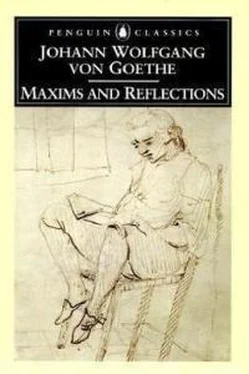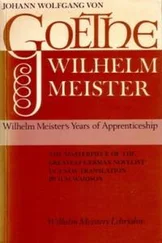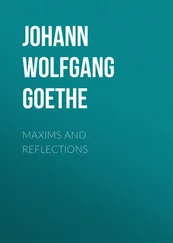240
Napoleon lived wholly in a great idea, but he was unable to take conscious hold of it. After utterly disavowing all ideals and denying them any reality, he zealously strove to realise them. His clear, incorruptible intellect could not, however, tolerate such a perpetual conflict within; and there is much value in the thoughts which he was compelled, as it were, to utter, and which are expressed very peculiarly and with much charm.
241
He considered the idea as a thing of the mind, that had, it is true, no reality, but still, on passing away, left a residuum—a caput mortuum —to which some reality could not be altogether refused. We may think this a very perverse and material notion; but when he entertained his friends with the neverending consequences of his life and actions, in full belief and confidence in them, he expressed himself quite differently. Then, indeed, he was ready to admit that life produces life; that a fruitful act has effects to all time. He took pleasure in confessing that he had given a great impulse, a new direction, to the course of the world's affairs.
242
It always remains a very remarkable fact that men whose whole personality is almost all idea, are so extremely shy of all phantasy. In this case was Hamann, who could not bear the mention of "things of another world." He took occasion to express himself on this point in a certain paragraph, which he wrote in fourteen different ways; and still, apparently, he was never quite satisfied with it.
Two of these attempts have been preserved to us; a third we have ourselves attempted, which we are induced to print here by the preceding observations.
243
Man is placed as a real being in the midst of a real world, and endowed with such organs that he can perceive and produce the real and also the possible.
All healthy men have the conviction of their own existence and of an existence around them. However, even the brain contains a hollow spot, that is to say, a place in which no object is mirrored; just as in the eye itself there is a little spot that does not see. If a man pays particular attention to this spot and is absorbed in it, he falls into a state of mental sickness, has presentiments of "things of another world," which are, in reality, no things at all; possessing neither form nor limit, but alarming him like dark, empty tracts of night, and pursuing him as something more than phantoms, if he does not tear himself free from them.
244
To the several perversities of the day a man should always oppose only the great masses of universal history.
245
No one can live much with children without finding that they always react to any outward influence upon them.
246
With any specially childish nature the reaction is even passionate, while its action is energetic.
247
That is why children's lives are a series of refined judgments, not to say prejudices; and to efface a rapid but partial perception in order to make way for a more general one, time is necessary. To bear this in mind is one of the teacher's greatest duties.
248
Friendship can only be bred in practice and be maintained by practice. Affection, nay, love itself, is no help at all to friendship. True, active, productive friendship consists in keeping equal pace in life: in my friend approving my aims, while I approve his, and in thus moving forwards together steadfastly, however much our way of thought and life may vary.
249
In the world people take a man at his own estimate; but he must estimate himself at something. Disagreeableness is more easily tolerated than insignificance.
250
You can force anything on society so long as it has no sequel.
251
We do not learn to know men if they come to us; we must go to them to find out what they are.
252
That we have many criticisms to make on those who visit us, and that, as soon as they depart, we pass no very amiable judgment upon them, seems to me almost natural; for we have, so to speak, a right to measure them by our own standard. Even intelligent and fair–minded men hardly refrain from sharp censure on such occasions.
253
But if, on the contrary, we have been in their homes, and have seen them in their surroundings and habits and the circumstances which are necessary and inevitable for them; if we have seen the kind of influence they exert on those around them, or how they behave, it is only ignorance and ill–will that can find food for ridicule in what must appear to us in more than one sense worthy of respect.
254
What we call conduct and good manners obtains for us that which otherwise is to be obtained only by force, or not even by force.
255
Women's society is the element of good manners.
256
How can the character, the peculiar nature of a man, be compatible with good manners?
257
It is through his good manners that a man's peculiar nature should be made all the more conspicuous. Every one likes distinction, but it should not be disagreeable.
258
The most privileged position, in life as in society, is that of an educated soldier. Rough warriors, at any rate, remain true to their character, and as great strength is usually the cover for good nature, we get on with them at need.
259
No one is more troublesome than an awkward civilian. As his business is not with anything brutal or coarse, he might be expected to show delicacy of feeling.
260
When we live with people who have a delicate sense of what is fitting, we get quite anxious about them if anything happens to disturb this sense.
261
No one would come into a room with spectacles on his nose, if he knew that women at once lose any inclination to look at or talk to him.
262
A familiar in the place of a respectful demeanour is always ridiculous.
263
There is no outward sign of politeness that will be found to lack some deep moral foundation. The right kind of education would be that which conveyed the sign and the foundation at the same time.
264
A man's manners are the mirror in which he shows his portrait.
263
There is a politeness of the heart, and it is allied to love. It produces the most agreeable politeness of outward demeanour.
266
Voluntary dependence is the best state, and how should that be possible without love?
267
We are never further from our wishes than when we fancy we possess the object of them.
268
No one is more of a slave than he who thinks himself free without being so.
269
A man has only to declare himself free to feel at the same moment that he is limited. Should he venture to declare himself limited, he feels himself free.
270
Against the great superiority of another there is no remedy but love.
271
It is a terrible thing for an eminent man to be gloried in by fools.
272
It is said that no man is a hero to his valet. That is only because a hero can be recognised only by a hero. The valet will probably know how to appreciate his like,—his fellow–valet.
273
There is no greater consolation for mediocrity than that the genius is not immortal.
274
The greatest men are linked to their age by some weak point.
275
We generally take men to be more dangerous than they are.
276
Fools and wise folk are alike harmless. It is the half–wise, and the half–foolish, who are the most dangerous.
277
To see a difficult thing lightly handled gives us the impression of the impossible.
278
Difficulties increase the nearer we come to our aim.
279
Sowing is not so painful as reaping.
280
We are fond of looking to the future, because our secret wishes make us apt to turn in our favour the uncertainties which move about in it hither and thither.
Читать дальше








![Иоганн Гёте - Итальянское путешествие [litres]](/books/398657/iogann-gete-italyanskoe-puteshestvie-litres-thumb.webp)



